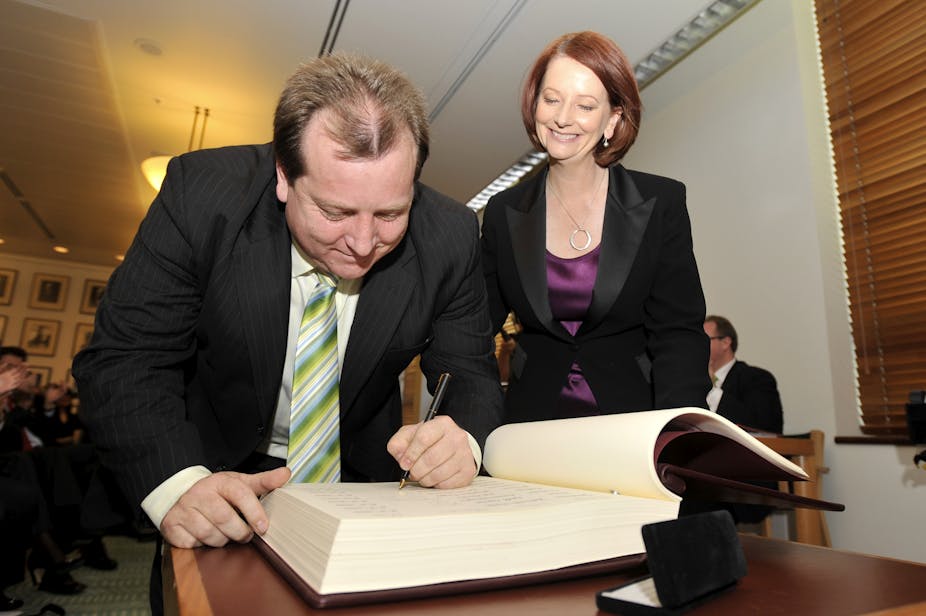The Victorian federal electorate of McEwen was a hard seat for Labor to win during the Howard years thanks to the popularity of the then-incumbent Liberal MP, Fran Bailey.
But this year, due to major changes to its boundaries, Labor should be able to consolidate its hold on McEwen.
History of victories
McEwen was named after Sir John McEwen, or “Black Jack” McEwen as he was known due to his ability to advance protectionist policies. McEwen was leader of the Country Party and became caretaker prime minister for 23 days after prime minister Harold Holt’s disappearance in 1967.
The district of McEwen was created in 1984 and was held by Labor until 1990 when it was won by Bailey. McEwen returned to Labor 1993 but in 1996 Bailey won the seat again and held it until 2010, though she did come very close to losing it in 2007, winning by just 31 votes. In 2010, when Bailey retired, there was a strong swing to Labor and Rob Mitchell won the seat with a 5.3% margin.
Redistribution in 2013
The seat boundaries have been changed for the 2013 election. Previously, McEwen spanned the western and eastern areas north of Melbourne through central Victoria, covering Gisborne in the west to Warburton in the east.
The electorate has become more compact following the redistribution and now covers a central corridor above Melbourne with the main towns being Wallan, Kilmore and Seymour. The suburbs of Sunbury and parts of Craigieburn comprise the southern part of the electorate.
The span of the electorate from the northern suburbs of Melbourne to parts of central Victoria means that there is great diversity in the district’s economic interests with cattle grazing and wool growing industries in its north alongside its manufacturing and commerce sectors of the south.
Candidates
The major party candidates are well known in the electorate and have served in local and state government. The incumbent, Labor’s Rob Mitchell, came close to defeating Bailey in 2007. He previously held an upper house seat in Victoria from 2002 to 2006 and has built a high public profile in the seat since winning in 2010.
The Liberal candidate, Donna Petrovich, also has a high public profile built from her time as a former councillor and Mayor of the Shire of Macedon Ranges. She is currently in the Victorian upper house, representing Northern Victoria (she will resign this position to contest McEwen). Petrovich replaced local businessman Ben Collier as the party’s candidate in April after Collier decided not to contest the election due to “unforeseen family circumstances”.
Seven other candidates are contesting, representing parties including Katter’s Australian Party, the Palmer United Party and the Sex Party, though there are no independents running. The Greens are also contesting the seat following a strong showing in 2010. The party received the third highest primary vote behind the Labor and the Liberal candidates with 11.8%, and will be looking to consolidate its support base in 2013.
Issues and election outcome
The Australian Electoral Commission (AEC) rates the seat as being rural with primary production its main industry. These are the areas that the Liberal Party has tried to galvanise with its policies, especially its opposition to the government’s carbon pricing scheme.
The southern parts of the seat that cover metropolitan suburbs such as Mernda comprise some very fast-growing new residential estates. The influx of new home owner-occupiers in these parts ensures that traditional election issues such as the economy and jobs become prominent throughout the campaign. Health care and education, also staples in campaigns, will also be important as growing populations necessitate growth in these service areas.
The major redistribution has worked in Labor’s favour by taking out Liberal voting areas while incorporating Labor parts in the south. In particular, the incorporation of northwestern Melbourne suburbs such as Sunbury and parts of Craigieburn has lifted Labor’s notional margin to 9.2%, which is categorised as “fairly safe” by the AEC.
With this buffer, observers can expect that the seat will be retained by Labor, even in the face of the expected moderate swing against the government in Victoria.

